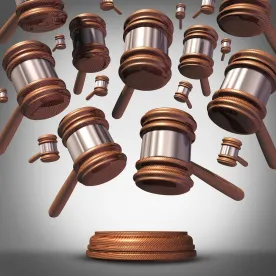Class action waivers in employment arbitration agreements do not violate federal law, the U.S. Supreme Court has ruled in a much-anticipated decision in three critical cases. Epic Systems Corp. v. Lewis, No. 16-285; Ernst & Young LLP et al. v. Morris et al., No. 16-300; National Labor Relations Board v. Murphy Oil USA, Inc., et al., No. 16-307 (May 21, 2018).
The Supreme Court’s decision resolves the circuit split on whether class or collective action waivers contained in employment arbitration agreements violate the National Labor Relations Act (NLRA). They do not, the Court ruled in a 5-4 decision. Justice Neil Gorsuch wrote for the majority of the Court. Justice Ruth Bader Ginsburg dissented, describing the majority holding as “egregiously wrong.”
Background
Arbitration agreements requiring employees to pursue work-related claims in arbitration, rather than in court, have long been enforced pursuant to the FAA. However, in 2013, the National Labor Relations Board (NLRB) ruled that employers violate the NLRA when they require employees, as a condition of employment, to assent to an agreement to resolve work-related disputes pursuant to an arbitration provision containing a class or collective action waiver.
The U.S. Court of Appeals for the Fifth Circuit rejected the NLRB’s rulings, first in D.R. Horton, Inc. v. NLRB, 737 F.3d 344 (5th Cir. 2013), and, subsequently, in Murphy Oil USA, Inc. v. NLRB, 808 F.3d 1013 (5th Cir. 2015). The Fifth Circuit, thereafter, was joined by the U.S. Courts of Appeals for the Second and Eighth Circuits, which enforced arbitration agreements requiring employees to submit their employment claims to individual, as opposed to class or collective, arbitration. (For more on D.R. Horton, see our article, Employer’s Mandatory Arbitration Clause Waiving Employee’s Right to Sue in Court Upheld.)
The U.S. Court of Appeals for the Seventh Circuit reached the opposite conclusion on May 26, 2016, thereby creating a circuit split. In Lewis v. Epic Systems Corp., 823 F.3d 1147 (7th Cir. 2016), the Seventh Circuit held arbitration agreements that prohibit employees from bringing or participating in class or collective actions violate the NLRA. In Morris v. Ernst & Young, 834 F.3d 975 (9th Cir. 2016), the Ninth Circuit agreed with the Seventh Circuit and the NLRB. (For more on these decisions, see our articles, Supreme Court Review Likely After Seventh Circuit Creates Split on Class and Collective Action Waivers under NLRA and Holding Class Waivers Violate the NLRA, Ninth Circuit Joins Circuit Split.)
Given the issue’s importance and the requests by both employers and the NLRB to have the Supreme Court decide the issue, it is unsurprising the Supreme Court granted writs of certiorari in January 2017 and consolidated all three cases from the Fifth, Seventh, and Ninth Circuits. In the past, Supreme Court’s decisions on the enforceability of class action waivers (albeit outside the employment context) were decided by 5-4 and 5-3 votes and were authored by the late-Justice Antonin Scalia. Immediately following his passing, the likelihood of a 4-4 tie was expected, until Justice Gorsuch joined the Court in April 2017.
Moreover, in June 2017, the Office of the Solicitor General, which previously had filed a petition for a writ of certiorari on behalf of the NLRB seeking to overturn the Fifth Circuit’s decision in Murphy Oil, reversed course and advised the Supreme Court that it would join the employers’ positions in this case. The NLRB was permitted to represent itself before the Supreme Court, creating the novel scenario where the United States government presented arguments on both sides of this issue.
During the oral argument, Justices Thomas and Gorsuch did not ask any questions. Otherwise, the Justices’ questions to counsel can be seen in hindsight as foreshadowing the majority and the dissenters. Chief Justice Roberts and Justices Kennedy and Alito primarily challenged NLRB General Counsel Richard Griffin, while Justices Ginsberg, Breyer, Kagan, and Sotomayor mostly queried the employers’ counsel.
Supreme Court’s Decision
The comprehensive opinion is succinct in its ultimate conclusion that the NLRA does not trump the FAA. Further, in applying common rules of statutory construction, the Court stated that Section 7 of the NLRA is focused on employees’ rights to unionize and engage in collective bargaining and that it does not extend to protecting an employee’s right to participate in a class or collective action.
Now, employers can be certain that class or collective action waivers in arbitration agreements do not violate the NLRA.






 />i
/>i
